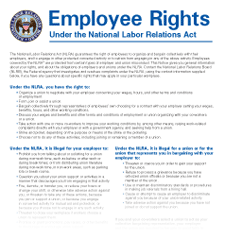HR Administration
NLRB Issues Employee Notification Rule
By Bill III
Sep. 28, 2011
UPDATE: According to the National Labor Relations Board, the posting date has been postponed from Nov. 14 to Jan. 31, 2012, in order to allow for enhanced education and outreach to employers, particularly those who operate small and medium sized businesses.
On Nov. 14, the National Labor Relations Board will begin requiring employers to notify their employees of their rights under the National Labor Relations Act. Both unionized and nonunionized employers must get up to speed on the new posting requirements.
Private-sector employers with workplaces under NLRB jurisdiction (all but the smallest companies) will be required to post the employee rights notice on bulletin boards in the same area that other notices are typically posted. Employers that customarily post employee notices about personnel rules or policies on the Internet, or a company intranet site, will be required to post the board’s notice on those sites as well.
Copies of the notice will be available from the agency’s regional offices. It may also be downloaded from the NLRB’s website (nlrb.gov). The notice states that employees have the right to:
1. Act together to improve wages and working conditions.
2. Form, join and assist a union.
3. Bargain collectively with their employer.
4. Refrain from any of these activities.
It also provides examples of unlawful employer and union conduct and instructs employees on how to contact the NLRB with questions or complaints.
The final rule was modified based on comments received from the public and is less burdensome than the rule that was originally proposed. For instance, the notice is not required to be reproduced in color.
Earlier versions of the rule required that employers also distribute the notice via email, voice mail, text messaging or related electronic communications if they customarily communicate with their employees in that manner. The final rules contain no such requirement, nor are there any recordkeeping provisions.
The new rule treats failure to post the notice as an unfair labor practice. Unfair employer labor practices, however, were created by Congress, not an administrative body. Section 8(a)(1) of the NLRA defines an unfair labor practice as conduct “interfering with, restraining or coercing employees in the exercise of their rights to self-organization or for mutual aid or protection.”
So exactly how does not doing something (e.g., failing to post a notice) amount to interference, restraint or coercion? It doesn’t. The NLRB has developed a new subsection of the NLRA without congressional approval, creating a new unfair labor practice. In addition to being labeled as an unfair labor practice, failure to post the notice may toll the six-month statute of limitations.
That means an employer could potentially be held liable for unfair labor practices that occurred a year or more before. Failure to post the notice may also be cited as evidence of anti-union animus in unfair labor practice cases where that is a necessary element of a violation. The new rule has already been challenged in the courts as usurping power by an administrative agency with a political agenda.
Like it or not, the rule is here, meaning human resources leaders need to print out and post the notice by Nov. 14. Doing so may lead to questions from employees, so train supervisors on the meaning of the notice, the company’s position on unionization, the significance of authorization cards and how and when to communicate lawfully about those subjects. Employers should take this opportunity to review labor relations programs and perform a bargaining unit analysis.
Nonunion employers may wish to seek guidance on union avoidance strategies. Some companies may choose to post a side notice letting employees know that they prefer to remain union-free. As always, tread carefully, and seek the advice of an experienced labor attorney if you are uncertain about how to proceed.
Bill Trumpeter and Jay Elliott are members of Miller & Martin’s Labor Relative Practice Group in the firm’s Chattanooga, Tennessee, office. They may be reached at btrumpeter@millermartin.com and jelliott@millermartin.com, respectively.
Schedule, engage, and pay your staff in one system with Workforce.com.
